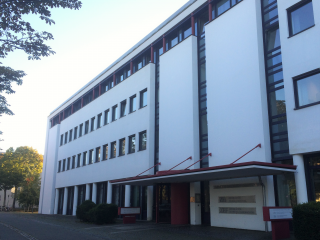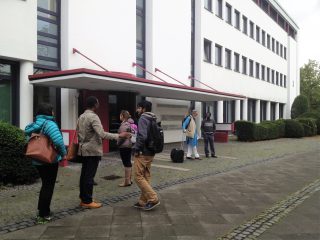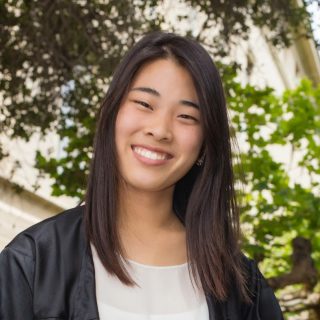A blog post by Mariko NAKAMURA
Mariko earned a MSc degree at IPADS in September 2016 and is now attending ZEF’s Interdisciplinary course at the University of Bonn in Germany.

The ZEF building:
ZEF has been in here since the summer of 1997.It is right next to an art museum.
The orientation gives the new ZEF doctoral students (and me!) an interesting overview of the program.
Nestled behind the Kunstmuseum art museum near Heussallee station, ZEF, the Center for Development Research at the University of Bonn in Bonn, Germany, sits in silent excitement on this chilly morning of October 5th. The orientation for the 18th class of the ZEF doctoral students is about to begin.
Guten Morgen and Welcome to ZEF
I’m at the back of the ZEF conference room which is full of 20 bright-eyed students, who obviously had their coffee this morning. (ZEF stands for Zetrum fur Entwicklungforschung, which is German for “Center for Development Research”.) Professor Borgemeister, the ZEF Director, opens the orientation with a hearty “Guten Morgen” to welcome everyone. He walks through an introduction of ZEF as a research institute and the doctoral course that these students have just begun their journey on. The morning is filled with laughs and thoughtful nods of agreement. The ZEF director closes his morning address with his hope that not only will the students produce scientific impact with their studies, but also that their research will create impact in social, political, and societal spheres. The professor explained thatZEF and the doctoral course aim to develop ZEF’s founding principles of internationality and transdisciplinary scientific research proficiency in their students.

Some of my fellow classmates before we go to lunch
International, Interdisciplinary, and Transdisciplinary
Between the 19 new students in this conference room, there are 13 different countries that they call home. Simply put, internationality is definitely found within the ZEF students. The countries cover all corners of the world, from the US to Indonesia, from Colombia to Ghana. Over half of the students every year come from Non-OECD countries. The cultural backgrounds of the students are quite different and their research interests vary just as widely.
During these next two months, through the interdisciplinary course, the ZEF doctoral students will bond and work with students outside of their discipline. (I’ll have the opportunity to join this course and work with these students.) After this course the students will move on to more specific coursework, corresponding to their individual research areas. The research areas of ZEF are broken into three departments: political and cultural change, economic and technological change, and ecology and natural resources management. The coursework is one major aspect of the ZEF doctoral program that encourages interdisciplinary and transdisciplinary studies.
ZEF also cultivates the guiding principles of international and interdisciplinary research through collaboration. In March 2016 six students from ZEF came to Tokyo for joint lectures, field training, and cultural exchange, alongside the International Program of Agricultural Studies (IPADS) at the University of Tokyo. (I’ll have to meet some of those students later!) As I listened to the orientation, I found several similarities between the IPADS program and the ZEF doctoral program, namely: the importance of both parent institutions as premier research institutions, the range of students in terms of research focus and background (although ZEF is a larger program than IPADS), and the breadth of the interests of the students in the program. If the orientation is any indicator and if this is anything IPADS, I look forward to what this course has in store for me.

Hi, thanks for reading! My name is Mariko Nakamura.
I’m excited to share my adventures here at ZEF at the University of Bonn with you.
/October 4, 2016